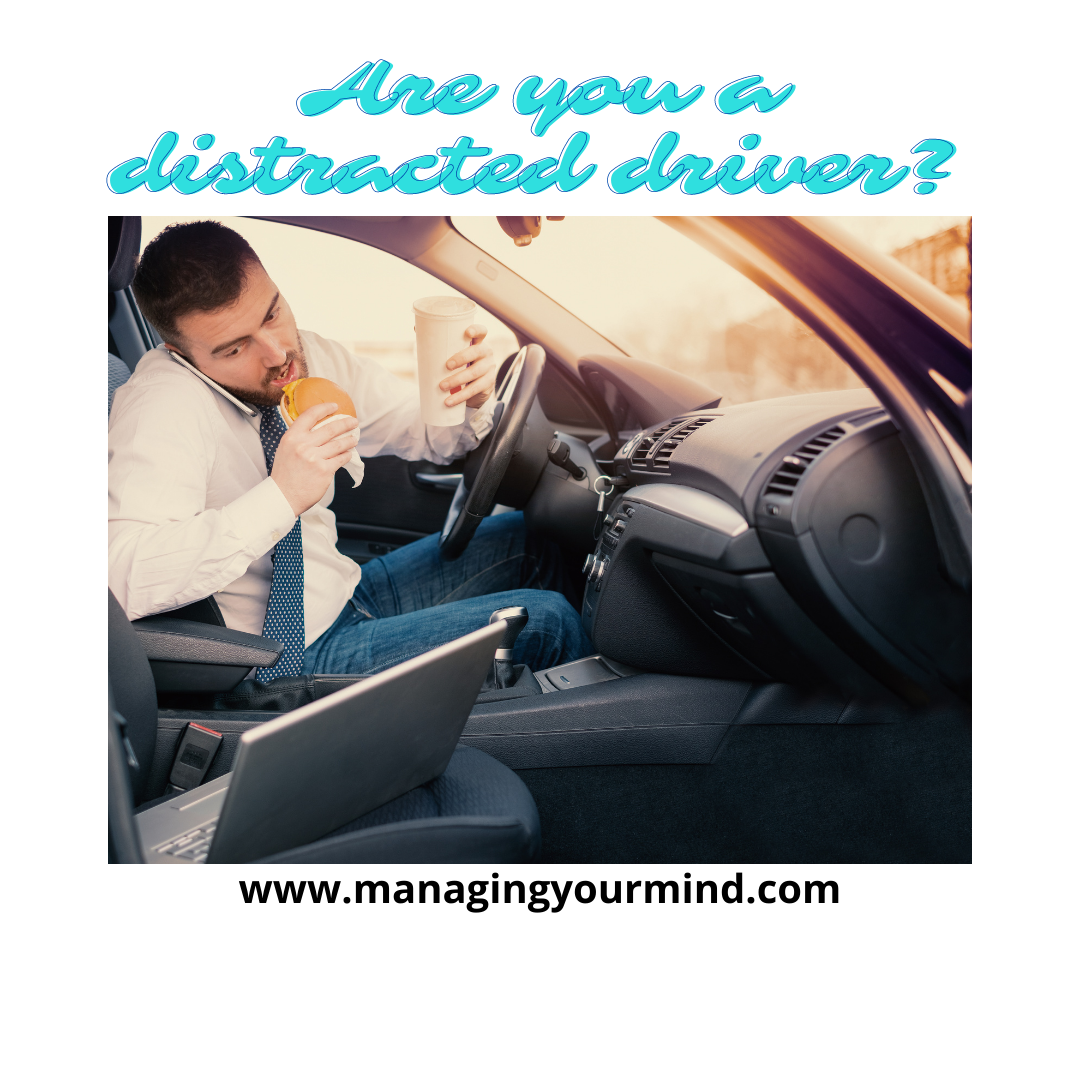Distracted Driving: Are you calling, texting, or zooming while driving?

Geraldine Markel, PhD
February 15th, 2021
Distracted driving plagues us, even during the pandemic. The statistics are clear. When distracted, drivers are more likely to cause accidents.
Distracted Driving Experiences
Most of us have experienced some discomfort and stress related to distracted driving. For example, you’re in the passenger seat while the driver is talking, texting, and fiddling with the audio. Politely, you say, “Please stop. It’s dangerous.” Irritated, the driver snaps, “You’re making a big deal about nothing.”
In other vehicles around the nation, the driver may respond:
- Don’t you trust me?
- Leave me alone. I can handle this!
- I only glance at the zoom meeting at stoplights.
Are these drivers unaware of the danger, arrogant about their multitasking skills, risk-loving, or in constant need of amusement? Regardless of the reason, their behavior endangers themselves and others.
Distracted Driving Statistics
For over a decade, research reports high rates of auto accidents due to distracted driving. For example, more than 2.5 million people are involved in crashes each year, and distracted driving is the leading cause. By some estimates, as many as 1,000 people are injured every day in crashes related to distracted driving (https://www.nsc.org/road-safety/get-involved/distracted-driving-awareness-month?utm_campaign=Driving+Safety+Dist-Driving&utm_source=adwords&utm_term=distractive%20driving&utm_medium=ppc&hsa_cam=283297839&hsa_ad=417676316529&hsa_net=adwords&hsa_acc=3965156914&hsa_grp=41101759346&hsa_tgt=kwd-17851704059&hsa_ver=3&hsa_src=g&hsa_kw=distractive%20driving&hsa_mt=b&gclid=Cj0KCQiAmfmABhCHARIsACwPRABpqaKMxMMaWNl8OKrEjwY5B91t0uaOcxo208Jf2so1cARGCyB7l6QaAsVXEALw_wcB.)
Presently during the COVID-19 pandemic, Zoom meetings present a new driving distraction (https://www.youtube.com/watch?v=Yib EP55FzYs&ab_channel=KENS5%3AYourSanAntonioNewsSource.) After watching this video, it’s evident that even though fewer cars are on the road, distracted driving is on the rise.
What are Distracted Driving Myths and Facts?
Have we become so used to a culture of distraction that we buy into myths and ignore the facts. Here are a few myths to consider:
Myth: You can multitask while driving without any loss of driving accuracy.
Fact: Research shows that when you’re doing two things at once, your brain is just switching between tasks very rapidly. Every additional task you do while driving detracts from your ability to drive well and increases your chance of collision. It takes your brain up to 13 seconds to refocus on your surroundings after looking at your cell phone — even if you “only glanced at it for a second.” As your brain refocuses, your driving skills are not at their best. When you attempt to multitask while driving, your eye activity slows down, and your problem-solving skills are diminished (https://blog.drivedifferent.com/blog/10-distracted-driving-statistics-and-facts-for-safe-drivers#:~:text=More%20than%202.5%20million%20people,crashes%20related%20to%20distracted%20driving.)
Myth: Although it is dangerous to drive after drinking— it is OK to drive while talking, texting, or glancing at a zoom meeting.
Fact: People are as impaired when they drive and talk on a cell as they are when they drive intoxicated at the legal blood-alcohol limit of 0.08% (https://www.enddd.org/the-facts-about-distracted-driving/?gclid=Cj0KCQiAmfmABhCHARIsACwPRABiQj0nC_n_waSvff1J6cdYRI8V5svUVuPlWpzy8m5dVuvFLOijsM0aAvRhEALw_wcB.)
Do you know someone who while drinking always assigns a designated driver but insists it’s alright to talk on the phone–even during inclement weather? Besides pleading for greater care, perhaps logic and statistics will help change their behavior.
What is Distracted Driving?
Distracted driving is any activity that could divert a person’s attention away from the primary task of driving. All distractions endanger driver, passenger, and bystander safety. As an example, texting involves three types of distraction:
- manual (moving your hands).
- visual (taking your eyes off the road).
- cognitive (mind-wandering).
Driving while listening to music is not considered distracting when the volume is moderate.
Distracted Driving Self-Check:
Are you paying attention to the ways you and others engage in distracted driving? To what degree do you deny the statistics or ignore your responsibility for safe driving?
- __ I text more than I should.
- __ I use my mobile phone too often.
- __ I often eat or drink while driving.
- __ I talk to passengers turning to see them.
- __ I can’t help fixing my hair or engaging in other grooming.
- __ I glance at notes or other print materials.
- __ I misuse a navigation system.
- __ I occasionally watch a video or Zoom meeting.
- __ I constantly adjust a radio, CD player, or iPhone.
- __ I smoke or vape while driving.
7 Guidelines to Curb Your Distracted Driving Habits:
- Open your mind to the facts about distracted driving and the bad habits you have.
- Visualize those you love and feel how devastated they will be if you are in a serious accident or kill or maim others.
- Look in the mirror as ask, “Am I in control of my safety and the safety of others, or am I neglectful of my ethical and moral responsibilities?
- Make a serious commitment. Pledge to take action.
- Leave your phone on the back seat or somewhere you can’t reach it. Don’t depend on hands-free calling.
- Pullover if you must make or answer a call.
- Stop if you need to eat something or groom yourself. You’ll avoid the dangerous consequences of burns from hot coffee or a poke in the eye from a mascara wand, not to mention stains from ketchup, mustard, or ice cream.
Many otherwise high-achieving professionals fail to use their smarts when driving. Intellectually, they understand the dangers but somehow feel that they can disregard sensible driving rules. The painful reality is all of us need to follow the rules of the road.
Work with your team and family to protect yourself and others. If you are a leader, you have the power and responsibility to stop distracted and sometimes reckless driving behavior.
Need some strategies or accountability with distractions while driving or working remotely? Contact geri@managingyourmind.com or schedule a complimentary, 20-minute, “Stop the Distractions” coaching session at https://go.oncehub.com/GeraldineMarkelPhD.